|
|
|
Sort Order |
|
|
|
Items / Page
|
|
|
|
|
|
|
| Srl | Item |
| 1 |
ID:
169012
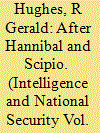

|
|
|
|
|
| Summary/Abstract |
‘I sincerely hope that they (relations between India and Pakistan) will be friendly and cordial. We have a great deal to do, both states, and I think that we can be of use to each other (and to) the world.’ Muhammad Ali Jinnah (1876–1948).1 ‘Intelligence links between neighbours are obviously desirable. It is better to institutionalise them now, rather than trying to activate them in times of crisis (that is why they failed in [the terrorist attacks of] 26/11).2 In due course, both sides would understand the need for ‘open’ intelligence posts in diplomatic missions. In the meantime, petty harassment of each other’s officers and staff could end. Intelligence links can succeed where all others fail. What agencies can achieve is not at times even conceivable in political or diplomatic channels.’ A.S. Dulat and Asad Durrani.3
|
|
|
|
|
|
|
|
|
|
|
|
|
|
|
|
| 2 |
ID:
141155
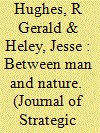

|
|
|
|
|
| Summary/Abstract |
This article argues for the continued relevance of the work and theories of the British Geostrategist Sir Halford J. Mackinder (1861-1947). It asserts that commentators and scholars who seek to marginalise Mackinder have too often dismissed his theories without setting them in the context of their continued endorsement in crucial areas of the globe. After 1945, despite his theories being tainted by association with Nazi Germany and Imperial Japan, both Moscow and Washington recognised the utility of Mackinder’s work and tailored policy accordingly. The end of Cold War saw Mackinder fall out of favour as his model was deemed unsuitable for policy analysis by a number of influential thinkers. It is argued here that, in recent years, the arena of international politics has seen a rehabilitation of Mackinder, accompanied by a resurgence of interest in Geopolitics. Finally, the piece examines those areas of the contemporary globe where Mackinder’s influence is greatest.
|
|
|
|
|
|
|
|
|
|
|
|
|
|
|
|
| 3 |
ID:
108626
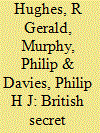

|
|
|
| 4 |
ID:
173966
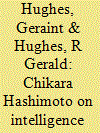

|
|
|
|
|
| Summary/Abstract |
‘We cannot allow [Nasser], who has neither the authority of a throne nor of a parliament to destroy our base and threaten our rear’ Harold Macmillan, diary entry for 23 September 1955
|
|
|
|
|
|
|
|
|
|
|
|
|
|
|
|
| 5 |
ID:
106330
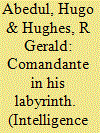

|
|
|
| 6 |
ID:
083328
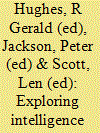

|
|
|
|
|
| Publication |
London, Routledge, 2008.
|
| Description |
xvii, 332p.
|
| Standard Number |
9780415349987
|
|
|
|
|
|
|
|
|
|
|
|
Copies: C:1/I:0,R:0,Q:0
Circulation
| Accession# | Call# | Current Location | Status | Policy | Location |
| 053839 | 327.12/HUG 053839 | Main | On Shelf | General | |
|
|
|
|
| 7 |
ID:
116162
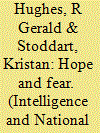

|
|
|
|
|
| Publication |
2012.
|
| Summary/Abstract |
This article explores a number of debates that have dominated intelligence studies since the terrorist attacks of 11 September 2001. It examines a number of inherent tensions, involving individuals and institutions, which threaten the long-term compatibility of the national security state with liberal democracy. The notion as to whether or not the use of extreme coercive measures (such as torture) can ever be justified is examined, as is the question as to whether such measures are self-defeating. The piece examines how liberal democracies seek to protect themselves in the light of rapid changes via a globalised media, the Information Revolution, and the proliferation of advanced technology and weapons of mass destruction amongst state and non-state actors. These issues are discussed with particular reference to the use of intelligence in Afghanistan, Iraq, Iran, North Korea and other global trouble spots. Finally, the article speculates on the future of the increasingly enmeshed relationship between policy-makers, intelligence agencies and the media. It is concluded that, without a clear agenda for the modification of the mechanisms for accountability and oversight, this triangular relationship will, despite its interdependence, be fraught with increasing difficulties.
|
|
|
|
|
|
|
|
|
|
|
|
|
|
|
|
| 8 |
ID:
087531
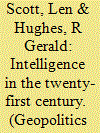

|
|
|
|
|
| Publication |
2009.
|
| Summary/Abstract |
This article outlines and explores some recent changes that have taken place in the practice and organization of western intelligence. American concern with organizational reform of its intelligence community is outlined and contrasted. Other transatlantic comparisons are made, in particular concerning debates about intelligence and human rights. The legacy of British experience in Northern Ireland for attitudes to torture and preservation of the rule of law is examined. The British experience of 'talking to terrorists' is also explored. Prospects for, and expectations of, the future, including the likelihood of catastrophic terrorism are discussed. The argument is made that the 'War on Terror' is a 'battle of ideas' and values.
|
|
|
|
|
|
|
|
|
|
|
|
|
|
|
|
| 9 |
ID:
085085
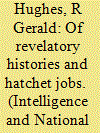

|
|
|
|
|
| Publication |
2008.
|
| Summary/Abstract |
This article explores a number of issues in the contemporary study of intelligence. These issues are methodological (relating to engagement with 'primary' sources), epistemological (concerned with notions of 'bias' and objectivity), and presentational (dealing with how scholars locate their work within existing debates). The article will contend that the study of intelligence, largely because of its ambiguous positioning on the borderland between political science and history, has been somewhat isolated from the debates over theory and method that have flourished in the wider historical discipline in recent decades, and that an engagement with such literature will yield commensurate benefits. Finally, the article will explore the place of intelligence history within the wider discourse of 'popular' history. Given its potentially sensational content, some intelligence literature is targeted at a 'popular' readership, but many of the claims made in authoring, promoting and reviewing such books are highly problematic. Since this is inimical to scholarly rigour, and is unlikely to facilitate wider public understanding of major historical issues, such matters need to be addressed
|
|
|
|
|
|
|
|
|
|
|
|
|
|
|
|
|
|
|
|
|